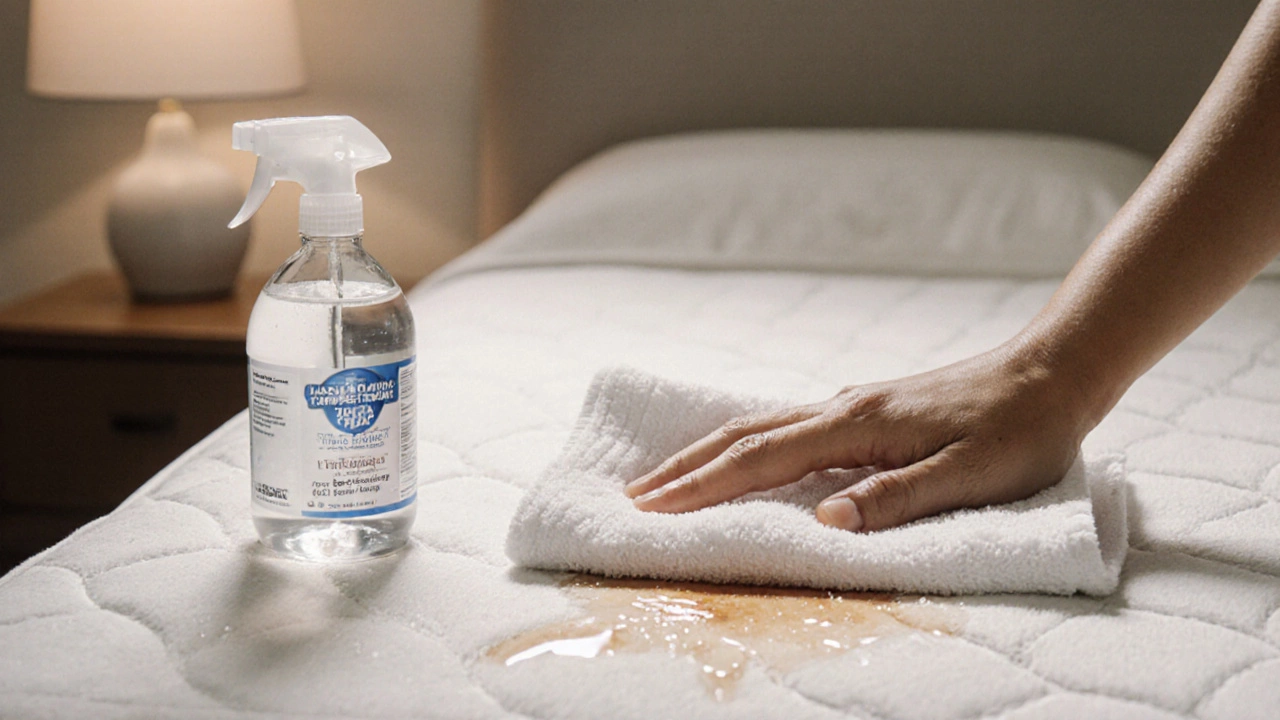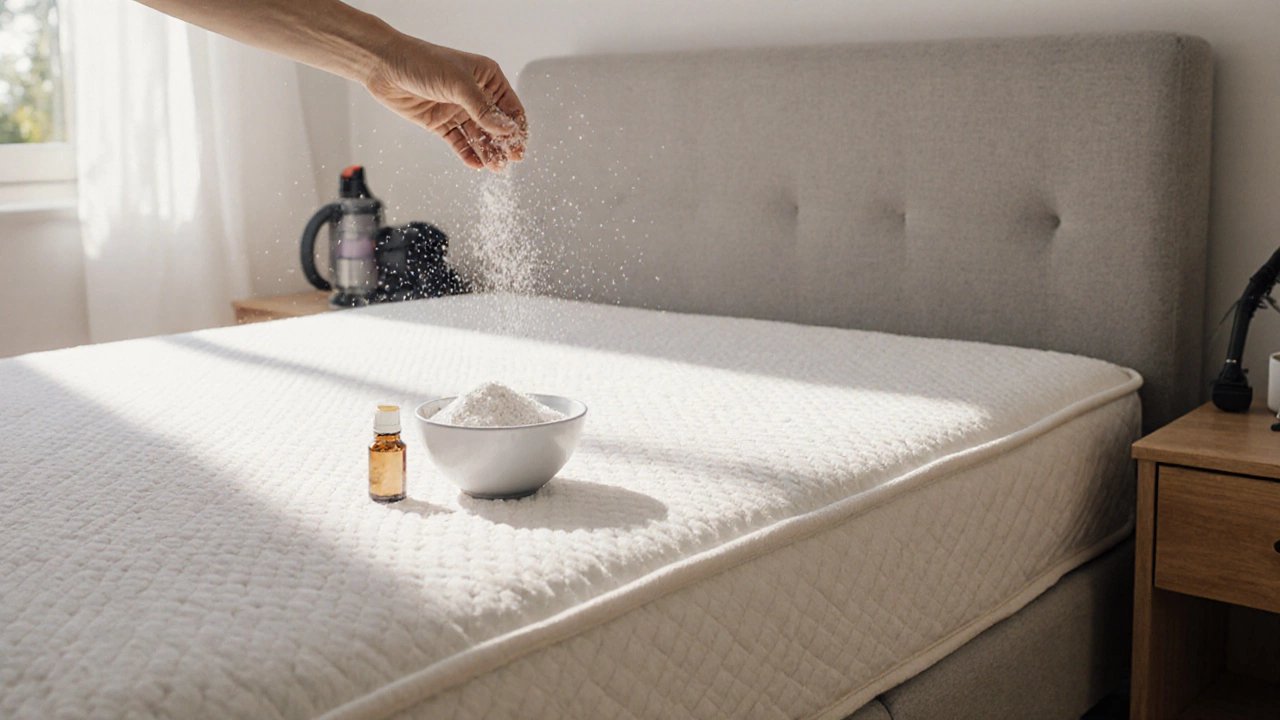Mattress Cleaning Solution Calculator
Personalized Cleaning Mix
Enter your mattress size and stain type to get the perfect solution
Baking Soda Mix (for Odor)
1 Use cups of baking soda
2 Add drops of tea tree or lavender oil
Stain Remover Mix
1 Mix cup white vinegar
2 Add cup cold water
3 Add drop of dish soap
Pro Tip:
Important Notes
Stains, sweat, dust mites, and weird smells - your mattress takes a beating. And if you’ve ever tried to clean one with just water and a sponge, you know it doesn’t cut it. You need the right mix. Not fancy chemicals. Not expensive sprays. Just a few things you already have in your kitchen.
Why You Can’t Just Wipe It Down
Mattresses aren’t like countertops. They’re made of foam, cotton, and fabric layers that soak up everything: body oils, saliva, dead skin, urine, sweat, even spilled coffee. Water alone won’t pull out the gunk - it just pushes it deeper. And if you over-wet it, you risk mold, mildew, and a mattress that never dries properly. That’s why cleaning isn’t about wiping. It’s about lifting, absorbing, and neutralizing.The Basic Mix: Baking Soda and Essential Oil
This is the go-to for odor removal and light cleaning. You don’t need a recipe book. Just grab a cup of baking soda and a few drops of tea tree oil or lavender oil. Tea tree oil kills bacteria and dust mites. Lavender smells nice and has mild antiseptic properties. Mix them together in a bowl, then sprinkle the powder evenly over the whole mattress. Let it sit for at least 30 minutes - overnight is better. Then vacuum it up with a hose attachment. You’ll be surprised how much dust and debris comes out. This step alone removes 80% of the smell and allergens in most mattresses.For Fresh Stains: Vinegar, Water, and Dish Soap
Spilled milk? Sweat ring? Blood? You need something that breaks down proteins and lifts stains without soaking the mattress. Mix one part white vinegar, one part cold water, and a few drops of clear dish soap (like Dawn or Fairy). Pour it into a spray bottle. Don’t drench it. Spray lightly over the stain. Let it sit for five minutes. Then blot with a clean, dry towel. Don’t rub. Rubbing pushes the stain deeper. Blotting pulls it up. Repeat until the stain fades. Vinegar neutralizes odors and breaks down organic matter. The soap helps lift grease and oils. Cold water keeps proteins from setting. Hot water? Never use it on blood or urine stains. It locks them in.
What Not to Use
Some things sound like they should work - but they make things worse.- Hydrogen peroxide - bleaches fabric and can leave yellow rings on memory foam.
- Ammonia - smells terrible, reacts badly with urine, and can damage mattress fibers.
- Commercial carpet cleaners - they’re too wet. Mattresses aren’t carpets. You’ll end up with a damp, smelly mess.
- Essential oils straight on fabric - they’re concentrated. Always dilute them in baking soda or water first.
Deep Cleaning: The Two-Step Method
If your mattress hasn’t been cleaned in over a year, do this twice a year:- Deodorize with baking soda - sprinkle generously, let sit overnight, vacuum thoroughly.
- Treat stains with vinegar solution - spot clean any visible marks using the vinegar-water-soap mix. Let dry completely before putting sheets back on.
How Often Should You Clean Your Mattress?
Most people clean their mattress once a year - if they remember. That’s not enough. If you sweat a lot, have pets, or kids who jump on the bed, clean it every 3-4 months. Dust mites multiply fast. They feed on dead skin. A single mattress can hold millions of them. And their droppings are a major trigger for allergies. Regular cleaning cuts exposure. You don’t need to strip the bed every week. But a quick sprinkle of baking soda every month? That’s easy. Vacuum it after a week. You’ll notice fewer sneezes in the morning.Protect It Going Forward
Once it’s clean, don’t let it get dirty again. Get a washable mattress protector. Not just any one - look for one that’s breathable and waterproof. Cotton with a polyurethane backing works best. Wash it every two weeks with your sheets. That’s your real defense. The protector catches sweat, spills, and skin cells before they sink into the mattress. It’s cheaper than replacing a mattress. And way easier than cleaning one.When to Call a Pro
If you’ve got a stubborn urine stain - especially from a pet or incontinence - or if the mattress smells sour even after cleaning, it might be time to call in help. Professional mattress cleaners use steam extraction with low-moisture tech. They don’t soak the mattress. They extract moisture as they clean. It’s not cheap - around £80-£120 in the UK - but if your mattress is still under warranty or you’ve had it for less than five years, it’s worth it. Don’t try to fix deep-seated mold or mildew yourself. That’s a health risk.Real-Life Example: My Neighbor’s Mattress
My neighbor, Sarah, had a mattress that smelled like old gym socks. She tried everything - air fresheners, Febreze, even a $50 steam cleaner from Amazon. Nothing worked. I told her to try the baking soda and vinegar method. She did it on a Saturday morning. Sprinkled baking soda with lavender oil. Left it overnight. Vacuumed. Then sprayed vinegar solution on the yellow spots near the headboard. Let it dry with the window open. Two days later, she texted me: “It smells like a new bed. I slept through the night for the first time in months.” She didn’t buy a new mattress. She just cleaned it right.Your mattress doesn’t need magic. It needs the right mix. Baking soda for smell. Vinegar and soap for stains. And time to dry. Do this twice a year, use a protector, and your mattress will last longer, smell better, and help you sleep deeper.
Can I use bleach to clean my mattress?
No. Bleach damages fabric, weakens foam, and can turn stains yellow. It’s too harsh for mattress materials and can release harmful fumes when mixed with other cleaners. Stick to vinegar and baking soda for safe, effective cleaning.
How long should I leave baking soda on my mattress?
At least 30 minutes, but overnight is best. The longer it sits, the more odors and moisture it absorbs. If you’re short on time, 30 minutes will still help, but don’t rush the vacuuming step - make sure you get all the powder out.
Can I use a vacuum with a beater bar on my mattress?
Avoid it. Beater bars are designed for carpets and can tear mattress fabric or damage internal layers. Use a vacuum with just a hose and upholstery attachment. It’s gentler and just as effective at pulling out dust and baking soda residue.
Does vinegar leave a smell on the mattress?
It smells strong while wet, but it disappears completely once dry. Vinegar evaporates quickly and doesn’t linger. If you’re worried, add a few drops of essential oil to the vinegar solution - it masks the smell while adding antibacterial benefits.
Can I clean a memory foam mattress the same way?
Yes, but be extra careful with moisture. Memory foam absorbs water slowly and dries slowly. Use less vinegar solution - spray lightly, blot immediately, and dry with a fan. Never soak it. Baking soda is safe and highly recommended for memory foam to control odors.
What’s the best way to prevent mattress stains?
Use a waterproof, breathable mattress protector and wash it every two weeks. Avoid eating or drinking in bed. Change your sheets weekly. These three habits stop 90% of stains before they happen.
